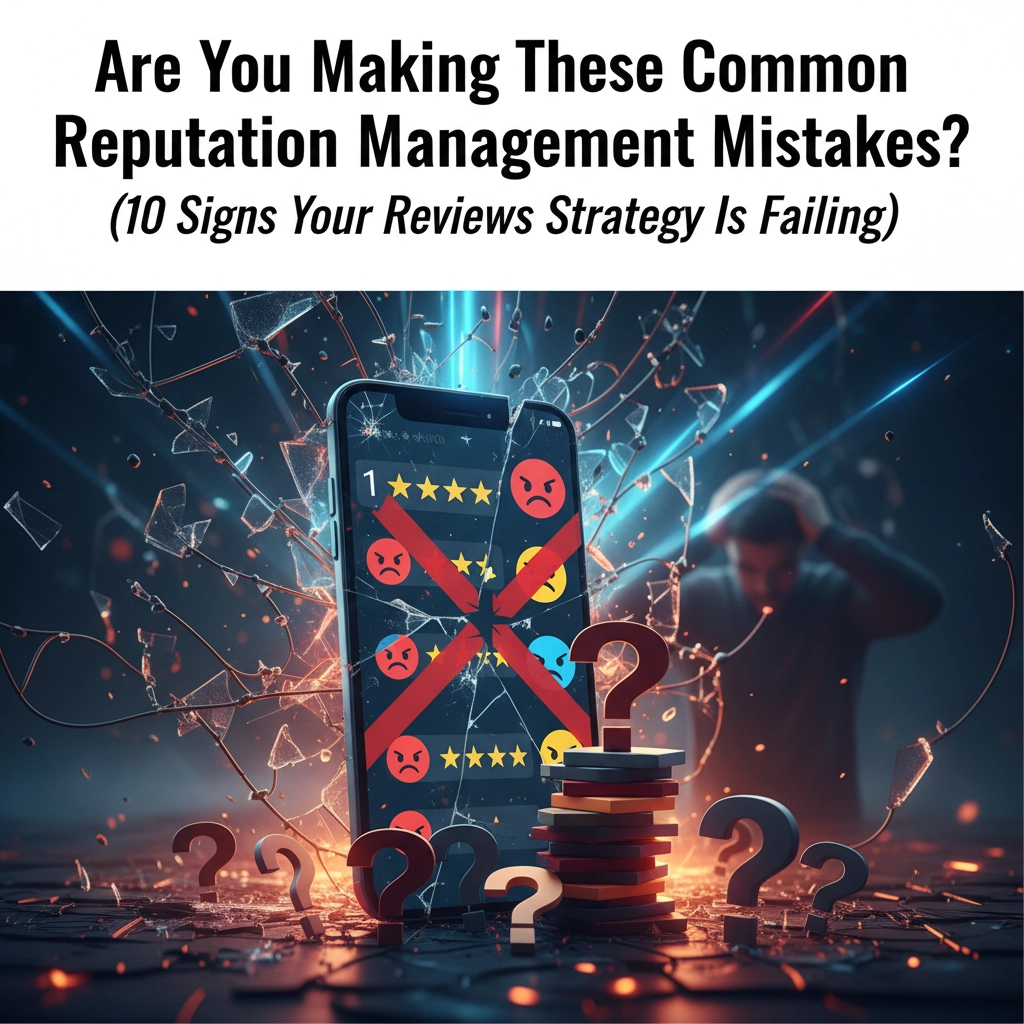Your business reputation can make or break your success in today's digital landscape. For local businesses in Fairfield, Ohio, where word-of-mouth and community trust still drive significant revenue, a damaged online reputation can be devastating. Yet many business owners are unknowingly sabotaging their own reputation management efforts through common mistakes that push customers straight to their competitors.
If you're wondering why your phone isn't ringing as much as it used to, or why potential customers seem to be choosing other businesses over yours, the answer might be hiding in plain sight: in your online reviews and reputation management strategy.
The Hidden Costs of Reputation Management Mistakes
Before diving into the specific mistakes, it's crucial to understand what's at stake. Research shows that approximately 87% of consumers read online reviews before making a purchase decision, and 94% will avoid a business based on negative reviews. For local businesses competing in markets like Fairfield, this means every unaddressed negative review and every reputation management misstep directly impacts your bottom line.

The problem isn't just losing individual customers: it's the ripple effect. One unhappy customer who leaves a scathing review can influence dozens of potential customers who never even contact your business. They simply move on to a competitor with better reviews.
Most Damaging Reputation Management Mistakes
Ignoring Negative Reviews Entirely
The single most destructive mistake local businesses make is simply pretending negative reviews don't exist. When customers take the time to leave feedback: whether positive or negative: they expect acknowledgment. Silence sends a clear message: you don't care about customer concerns.
This is particularly damaging for service-based businesses where trust is paramount. When potential customers see unanswered complaints about poor service, missed appointments, or billing issues, they naturally assume these problems will happen to them too.
Responding Emotionally to Criticism
When business owners do respond to negative reviews, many make the critical error of responding defensively or emotionally. Comments like "That customer was impossible to please" or "They're lying about what happened" immediately destroy your credibility with future customers.
Professional, measured responses that acknowledge concerns and offer solutions demonstrate maturity and customer service commitment. Even when reviews seem unfair or inaccurate, your response should focus on what you can learn and improve.
Using Fake Reviews as a Strategy
Some businesses attempt to boost their reputation through fake positive reviews or by encouraging friends and family to leave glowing feedback about services they never received. This strategy inevitably backfires when customers notice reviews that don't match their experience or when platforms detect and remove suspicious reviews.
Google and other platforms have sophisticated algorithms to identify fake reviews based on IP addresses, review patterns, and language analysis. Getting caught using fake reviews can result in penalties that make your legitimate reviews less visible in search results.

Lacking a Systematic Monitoring Approach
Many businesses only discover reputation issues when someone tells them about a negative review or when they notice a drop in customers. By then, the damage is already spreading. Effective reputation management requires consistent monitoring across multiple platforms: Google, Facebook, industry-specific sites, and even general complaint sites.
Inconsistent Brand Presentation
Your reputation extends beyond just reviews. When customers encounter different versions of your business information, conflicting brand messages, or outdated content across various platforms, it creates doubt about your professionalism and attention to detail.
10 Warning Signs Your Reviews Strategy Is Failing
1. Your Review Response Rate Is Below 50%
If you're only responding to some reviews: typically just the negative ones: you're missing opportunities to engage with satisfied customers and show potential customers that you value all feedback. A healthy review response rate should be at least 70-80%.
2. Your Average Rating Is Declining
Track your average rating over time across platforms. If you notice a steady decline, it indicates systematic issues in your business that need immediate attention. Don't just focus on getting more positive reviews; address the root causes of negative feedback.
3. Negative Reviews Mention the Same Issues Repeatedly
When multiple reviews mention similar problems: poor communication, billing issues, service delays: it's a clear signal that these aren't isolated incidents but systemic issues requiring operational changes.
4. Your Competitors Have Significantly Better Ratings
Research your local competitors' review profiles. If they consistently maintain higher ratings with similar review volumes, analyze what they're doing differently. Look at how they respond to reviews, what services they emphasize, and how they present their brand online.
5. You're Getting Fewer Reviews Over Time
A declining review volume often indicates decreasing customer engagement or satisfaction. Healthy businesses should see steady review growth as they serve more customers and improve their review collection processes.

6. Your Response Time to Reviews Exceeds 24-48 Hours
In today's fast-paced digital environment, delayed responses to reviews: especially negative ones: signal poor customer service. Quick responses show that you're actively managing your business and care about customer feedback.
7. Your Reviews Lack Detail and Specificity
Generic reviews like "Great service!" or "Terrible experience!" provide little value to potential customers. A healthy review profile includes detailed feedback that mentions specific services, employee names, and particular aspects of the customer experience.
8. Negative Reviews Are Going Viral or Getting Shared
When individual negative reviews start getting significant engagement: shares, comments, or likes: it indicates that the issue resonated with a broader audience. This amplification can quickly damage your reputation beyond the original reviewer.
9. Your Online Presence Doesn't Match Customer Expectations
If customers frequently mention that your business didn't meet expectations set by your website, social media, or online listings, there's a disconnect between your digital presence and actual service delivery.
10. You're Losing Customers Without Understanding Why
The most telling sign of reputation management failure is unexplained customer loss. When people stop choosing your business and you can't identify specific reasons, online reputation issues are often the culprit.
The Path Forward for Fairfield Businesses
Reputation management isn't just about damage control: it's about proactively building trust and credibility in your community. Local businesses in Fairfield have unique advantages, including the ability to provide personalized service and build genuine relationships with customers.

The key to turning around a failing reputation strategy lies in systematic change: implementing consistent monitoring, developing response protocols, addressing operational issues that generate complaints, and creating processes that naturally encourage satisfied customers to share their positive experiences.
For businesses struggling with reputation management, professional help can make the difference between gradual recovery and continued decline. The investment in proper reputation management typically pays for itself through improved customer acquisition and retention.
Your reputation is one of your most valuable business assets. In a competitive local market like Fairfield, businesses that master reputation management gain significant advantages over those that don't. The question isn't whether you can afford to invest in reputation management: it's whether you can afford not to.
The businesses thriving in today's market aren't necessarily those with perfect service records; they're the ones that handle imperfection professionally, learn from feedback, and consistently demonstrate their commitment to customer satisfaction through their online presence and review management.





0 Comments